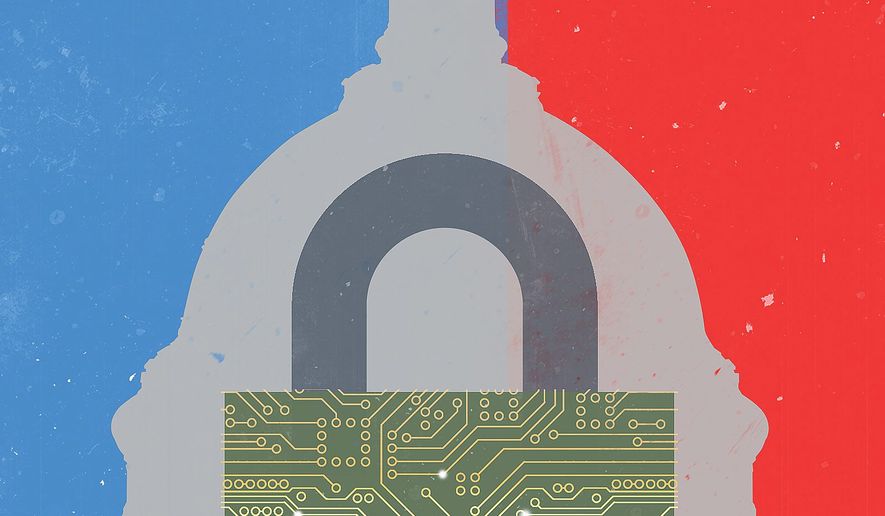OPINION:
As policymakers return to Washington to start the 116th Congress, Democrats will be dictating the direction of the House for the first time in eight years. While they may be tempted to use their newfound subpoena powers to explore issues like the president’s finances and Russian election interference, members will need to focus on policy if they plan to have any legislation signed into law.
With the uptick in privacy concerns among members of both parties, as well as the general fear of market dominance by a few large tech companies, the relatively untouched technology industry presents a promising starting point for lawmakers looking beyond President Trump and Russiagate. Democrats will likely be called on to rein in the industry, but doing so would be shortsighted; stifling the technology industry when it is on the verge of reshaping our modern economic system for the better will compromise the United States’ ability to retain its global market dominance. Thus, when developing technology-related measures, Democrats need to pursue policy solutions that are narrowly tailored to target problems without disrupting the industry entirely.
Moreover, given that Republicans control the Senate and the White House, any proposals will also need to appeal to those on the right. Crafting solutions that both Republicans’ and the Democrats’ constituents support is a tall order. Fortunately, modernizing federal information-technology, adopting open-data measures, and improving congressional understanding of technology are narrow solutions that Democrats and Republicans have championed, making them palatable options for a politically divided government.
Like your home computer, Congress’ computers need to be updated for functionality and security. Not only are older systems vulnerable to cyberattacks, they increase the cost of upkeep, meaning that we are throwing tax dollars down the drain just to keep these systems functioning. Congress has already passed the Modernizing Government Technology (MGT) Act to improve federal agency systems, but there is still more to be done. The 116th Congress should look to the president’s 2017 Federal IT Modernization report for ways to ensure that its own infrastructure and technology are up to date and secure.
In addition to IT modernization, the adoption of open data — or data that is machine-readable and available to the public — has historically been popular with both parties. This is because open data allows taxpayers to scrutinize how the federal government is using their money. The Digital Accountability and Transparency (DATA) Act and the Open, Public, Electronic and Necessary (OPEN) Government Data Act passed Congress with overwhelming majorities. Congress should ensure that these reforms are fully recognized and work with constituents to find more avenues to implement cost-saving open-data initiatives.
To achieve any technology policy goals, Congress must also do everything within its power to strengthen its knowledge of the hardware, software, and real-world applications of tech goods. During the 115th Congress, the Republican-controlled House appropriated funds to conduct a study on how to accomplish this goal. While many members have called for an immediate revival of the defunct Office of Technology Assessment (OTA), Democrats must allow the study to be completed, review it with a critical eye, and understand how a new technology policy arm like OTA will benefit members, their staff and the institution as a whole before settling on a strategy. It’s no secret that technologically savvy individuals are needed in the halls of Congress, but like the Republicans before them, Democrats must be deliberate in their approach to implementing and appropriating the necessary funds.
Democrats may be tempted to address concerns over content moderation — or what can and cannot be posted on websites — but this could be a dangerous route for them to take. During the 115th Congress, Republicans passed content-moderation legislation to weaken Section 230 of the Communications Decency Act, and the industry is already reeling from the unintended negative consequences of the law. Many legal websites have been shut down and bad actors have been driven underground, making them even more difficult to find and prosecute. Democrats must be vigilant when considering such legislation because, as history has shown, sometimes the best intentions have most egregious consequences.
Regardless of which issues House Democrats decide to pursue when it comes to technology, they must continue to focus their eyes on policy, not politics. Democrats have the chance to be the party of bipartisan progress, but if they give into their partisan whims, there will be nothing more than gridlock, and the constituents who elected them will feel the burden of their inaction. If Democrats do choose to legislate, they must be measured in their actions.
• Sasha Moss is a federal affairs manager and policy counsel for the R Street Institute.




Please read our comment policy before commenting.